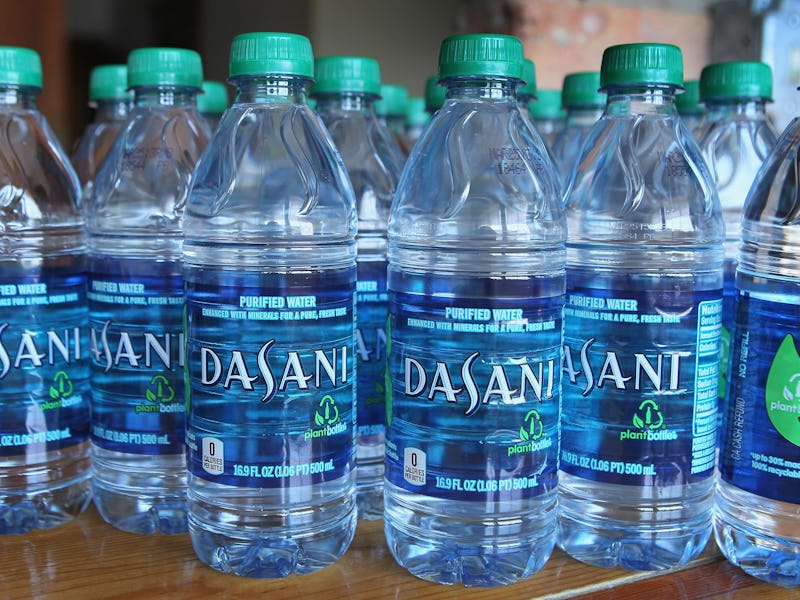Consumer Protection Group Target Dasani's 'Misleading' Label
Is Dasani hiding its water source?

When Aquafina admitted it was just tap water because it came from a Public Water Source, the company took a big step toward getting wary consumers to understand they’re paying a high premium for a dressed-up version of the same water that makes its way to the tap.
But there are still plenty of companies out there who’ve yet to come clean about exactly what you’re paying for.
So argues Kara Kaufman, spokesperson for the Think Outside the Bottle campaign, organized by Corporate Accountability International, a group that aims to “protect human rights, public health, and the environment from corporate greed and abuse around the world.”
The campaign launched in 2007, and pressured bottled water companies to disclose their sources and encourage consumers to choose the tap. With Aquafina not labeling bottles P.W.S, Kaufman says the next target is Dasani.
“That’s another company that’s been using the same public water sources and then turning around and overcharging consumers,” Kaufman tells Inverse. “They are absolutely misrepresenting their product.”
Coca-Cola, which owns Dasani, has yet to respond to interview requests for this story.
“We don’t believe that consumers are confused about the source of Dasani water,” Coca-Cola spokeswoman Diana Garza Ciarlante told the New York Daily News in 2007.
Though using the P.W.S. label, Aquafina also takes issue with referring to the brand as simply resold tap water, citing its trademarked filtration process. But Kaufman says municipal water sources have even higher standards when it comes to cleaning the same water on the way to your sink.
“Tap water is much more regulated than bottled water and is tested on a regular basis,” she says. “Public water systems send water users water quality reports and information about what is in our water is publicly available. With bottled water, this transparency is lost. Since public water systems are accountable to the public, we have the ability to advocate for what we do and don’t want in our water. Bottled water corporations, on the other hand, are not even required to disclose water quality reports.”
That argument is backed up by this U.S Government Accountability Office report on bottled water filtration methods that recommends the industry adopt standards to prevent rising levels of DEHP, an organic compound used to manufacture polyvinyl chloride plastics, called one of the top chemical threats to humans. Exposure to DEHP has been linked to a number of health risks in young animals, including development of the testicles and production of normal sperm, according to the FDA.
Two thousand times better than tap water, or just that expensive?
Bottled water is understandably careful to protect its branding, considering how insanely profitable it is. ConvergEx Group Chief Market Strategist Nick Colas explained consumers were flushing thousands on their favorite label of H2O in an interview with Business Insider:
“The [bottled water] industry grossed a total of $11.8 billion on those 9.7 billion gallons in 2012, making bottled water about $1.22/gallon nationwide and 300x the cost of a gallon of tap water,” Colas says. “If we take into account the fact that almost 2/3 of all bottled water sales are single 16.9oz (500 mL) bottles, though, this cost is much, much higher: about $7.50 per gallon, according to the American Water Works Association. That’s almost 2,000x the cost of a gallon of tap water and twice the cost of a gallon of regular gasoline.”
Those profits come at a high cost to the environment. The Container Recycling Institute estimates about 60 million plastic water bottles end up in landfills every single day. Every day! And that’s not counting bottles that are recycled.
Meanwhile, Kaufman and the Corporate Accountability International has reported successes in San Francisco as the city banned the sale of plastic water bottles on municipal property in 2014 and the Grand Canyon enacted a similar ban in 2012. So unless you live somewhere where clean drinking water is a serious issue, or your town is under a boil order, it could be time to give your tap another chance.